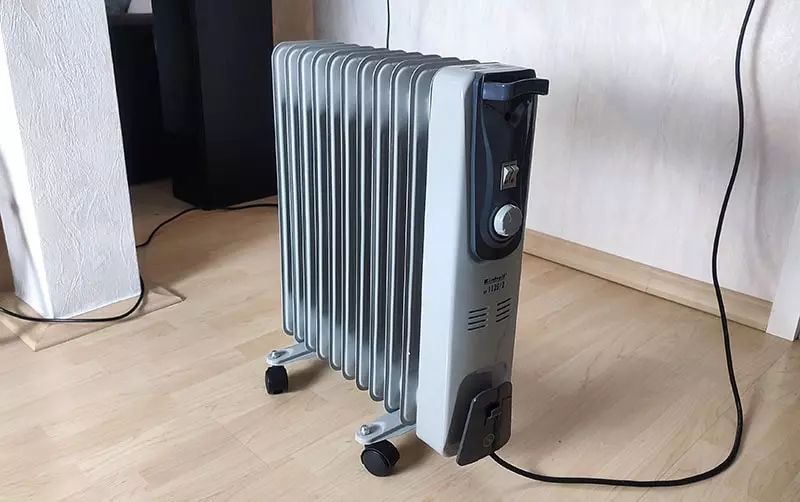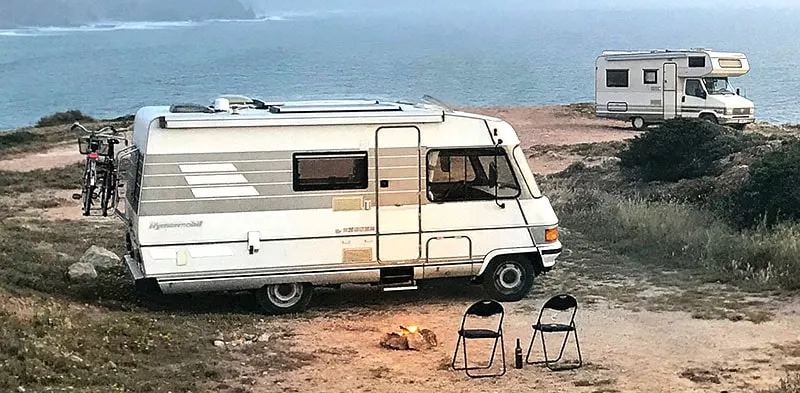Can you use an oil-filled radiator in an RV? Sure! But you have to make sure you use a proper power source!
Quick answer: Yes, you can use an oil-filled radiator in an RV. You can run any oil-filled radiator off shore power, off a generator, or off the batteries using an inverter. However, electric heating is not always the most cost-effective form of heating when you are off-grid.
In this article, we’re going to check all you need to know about oil-filled radiators. And in the end, we’ll see whether there are better heating options for your RV!
Recommended oil-filled radiator for RVs
You can run any oil-filled radiator in an RV. So, I would recommend you a model that is just as well-suited for indoor usage.
My favorite oil-filled radiator is this Pelonis oil-filled radiator (click here to see my review).
But, honestly, you can get just about any oil-filled radiator you like. All heaters are the same.
You could also get a smaller-sized 800W oil-filled radiator. Especially, if you don’t have the space.
But I found that they don’t provide enough heat for most RV sizes and in the end, you’ll opt for a stronger heater anyways.
How much power does an oil-filled radiator draw?
Most oil-filled radiators draw 1,500W of power. That’s just enough to keep a regularly-sized RV heated.
In an average household, running a 1,500W device for an hour would cost 21 cents, assuming an average electricity cost of 14 cents per kWh.
That’s the latest published US-official electricity rate. However, in reality, I’d suspect the cost increased significantly in the meantime.
So, I’d estimate the real cost in the upcoming months to be closer to 35 cents per hour of running a 1,500W space heater (on full power).
In an RV, you usually don’t need to blast your space heater on full power, except during wintertime. So, the average power consumption of a space heater would be closer to 1,000W, reducing the hourly cost to 20 cents.

Can RVs provide enough electricity for an oil-filled radiator?
To run an oil-filled radiator, you will need a power source that can provide at least 1,500W of power.
Realistically, it should provide at least 2,000W of power since you are using other devices in simultaneously.
RVs have the following energy sources:
RV shore power
Shore power is the power coming directly from the area’s electric grid. So, it’s almost the same as using your home’s wall outlet.
Shore power should always be capable of running a 1,500W space heater.
RV batteries
You can even run a space heater off car batteries or an RV battery pack. However, this is very costly, since you will need large batteries and an inverter.
Additionally, an oil-filled radiator will drain an average battery within 3 hours. After that, you’re left in the cold with an empty RV battery.
So, that’s not really an option.
Generator
If your RV power source is a generator, then you can power your oil-filled radiator with it.
The only requirement is that your generator produces more than 2,000W of power.
But that’s the case for almost all generators.
Solar
Mobile solar panels won’t produce enough power to run a space heater.
“To run a space heater continuously, you need 20 solar panels” Can you run a space heater off solar panels?
However, if you use a solar-powered battery, you will be able to generate enough electric energy for 1 or 2 hours of heating per solar panel.
Solar panels absorb the most energy from the sun when the weather is clear and the sunshine is perpendicular to the earth.
Unfortunately, this is usually the case during summer. That’s the main disadvantage of powering a space heater with off-grid solar panels.
You can only reasonably use solar panels if your RV has a fixed place and your solar panels are connected to the neighborhood’s electric grid and employ net metering.
With net metering, you feed energy into the grid instead of using it to charge your batteries.
Whatever amount of energy you generate compensates for the electricity you use. And you will only have to pay the difference.
But usually, most people move their RV around so this is not really an option.
How to reduce power usage of an oil-filled radiator
Power is limited in an RV.
If you are off-grid a lower power consumption causes your batteries to last longer.
So here are a few things you can do to reduce your oil-filled radiators’ power consumption.
Decrease the temperature setting
The most straightforward thing to do is to decrease the temperature of your oil-filled radiator.
Lower temperature means lower power consumption.
Use a heavy-duty extension cord
If you’re powering your oil-filled radiator directly off a generator (or any other power source placed outdoors) and you use an extension cord, make sure you use a heavy-duty one.
The right extension cord makes a significant difference in the heating efficiency.
A thin, cheap extension cord has a higher electrical resistance and, therefore, heats up quickly.
If your extension cord is partially outdoors, the hot extension cord will radiate a part of the heat energy outdoors. That’s obviously of no use.
Check this article to see which extension cord you can use: Can you use an extension cord with a space heater?
Insulate your RV
This one is actually my favorite tip!
Insulation is always a one-off expense. And after adding insulation it pays off for years!
Have a look at your RV and see where it lacks insulation. Maybe the walls are too thin? Or there are gaps in the walls where cold air can come in.
Fix your insulation using styrofoam (for covering large areas). Close the gaps using an insulating foam spray.
This will make a big difference. And not only will insulation prevent the heat from escaping in the cold seasons, but it will also prevent the heat from entering your RV in summer!
Are oil-filled radiators safe in an RV?
Yes, oil-filled radiators are the safest space heaters and they are completely RV-safe.
In contrast to other space heaters, oil-filled radiators don’t have an exposed heating element.
Instead, the heating element is embedded in the large metal body.
The oil inside the metal body then distributes the heat from the heating element to the metal surface.
This heat distribution is what makes an oil-filled radiator so exceptionally safe.
Conclusion
For off-grid heating in an RV, oil-filled radiators are not the best type of space heater.
Oil-filled radiators need a lot of electricity. So, you will have to either get a large battery or power them off shore energy only.
Instead, my suggestion for off-grid heating would be to use an off-grid heat source, such as propane.
I’ve written an article about propane heaters for RVs already, so have a look at that!
Propane heaters are independent of any electric grid or batteries. They work reliably when it’s cold, even when you have an electricity outage.
And on top of that, propane costs less than half of what electric heat would cost!
That’s why I would prefer a propane heater over an electric heater anytime!
